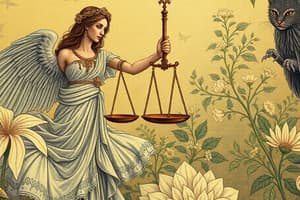Podcast
Questions and Answers
What major philosophical view does John Rawls oppose in his theory of justice?
What major philosophical view does John Rawls oppose in his theory of justice?
- Socialism
- Libertarianism
- Marxism
- Utilitarianism (correct)
What is one of the main criticisms Rawls has towards utilitarianism?
What is one of the main criticisms Rawls has towards utilitarianism?
- It is too complex to apply.
- It focuses on individual rights.
- It does not consider majority happiness.
- It may overlook the needs of the minority. (correct)
Which concept is central to John Rawls’ approach to justice?
Which concept is central to John Rawls’ approach to justice?
- Distribution of wealth
- Greatest happiness principle
- Veil of ignorance (correct)
- Social contract
Which of the following principles does Rawls advocate for a well-ordered society?
Which of the following principles does Rawls advocate for a well-ordered society?
John Rawls’ theory is heavily influenced by which philosopher’s interpretation of the Social Contract?
John Rawls’ theory is heavily influenced by which philosopher’s interpretation of the Social Contract?
What type of society does John Rawls aim to conceptualize through his theory of justice?
What type of society does John Rawls aim to conceptualize through his theory of justice?
Which award did John Rawls receive in 1999 for his contributions to philosophy?
Which award did John Rawls receive in 1999 for his contributions to philosophy?
In his theory, what does Rawls believe just societies must protect?
In his theory, what does Rawls believe just societies must protect?
Which of the following does NOT contribute to the compromise of justice in society according to Rawls?
Which of the following does NOT contribute to the compromise of justice in society according to Rawls?
What does Rawls mean by 'justice as fairness'?
What does Rawls mean by 'justice as fairness'?
What is the purpose of Rawls' hypothetical scenario?
What is the purpose of Rawls' hypothetical scenario?
What are the two elements of a well-ordered society according to Rawls?
What are the two elements of a well-ordered society according to Rawls?
How does Rawls suggest that hierarchy in bargaining power can be eliminated?
How does Rawls suggest that hierarchy in bargaining power can be eliminated?
What characterizes Kant's interpretation of the social contract?
What characterizes Kant's interpretation of the social contract?
What is a consequence of individuals having self-centered desires in law-making?
What is a consequence of individuals having self-centered desires in law-making?
In Rawls' theory, what is essential for all members of a society?
In Rawls' theory, what is essential for all members of a society?
Flashcards are hidden until you start studying
Study Notes
John Rawls' Theory of Justice
- Justice is a complex concept with varied interpretations, often defined through different philosophical perspectives.
- John Bordley Rawls, an influential American moral and political philosopher, is known for his work "A Theory of Justice" published in 1971.
- Rawls criticized utilitarianism for its potential to overlook the rights of minorities in favor of the majority's happiness.
Key Elements of Rawls' Philosophy
- Influenced by social contract theory and philosopher Immanuel Kant, Rawls viewed the social contract as universally accepted moral laws, not dictated by any single group.
- He introduced the concept of "justice as fairness," advocating for a neutral state that balances diverse values and perspectives within society.
Hypothetical Constructs
- Proposed a scenario called the "original position," where individuals make laws without knowledge of their own societal status (social, economic, physical).
- This "veil of ignorance" ensures fairness as no one can tailor rules to benefit their particular group.
Objectives of the Theory
- Aims to establish a well-ordered society characterized by:
- A framework that promotes the welfare of all its members.
- A public understanding of justice whereby all citizens recognize shared principles.
Circumstances of Justice
- Two types:
- Objective circumstances: External conditions that impact justice (e.g., social structures).
- Subjective circumstances: Individual perceptions and interpretations of justice.
Principles of Justice
- Advocates for equitable rules that do not favor specific social groups, aiming for uniform distribution of burdens and benefits among all citizens.
- Proposes the "maximin rule," which focuses on maximizing the minimum benefit for the least advantaged members of society.
Criticisms of Rawls' Theory
- Many critiques argue the practicality of his theoretical constructs, questioning the possibility of objective decision-making away from biases.
- Some assert that his ideas may not adequately address existing disparities and systemic inequalities.
Conclusion & Implications
- Rawls’ theory redefined political philosophy by emphasizing fairness and equity in justice, aiming to protect minority rights within democratic societies.
- Continues to influence contemporary discussions on social justice, ethics, and political theory.
Studying That Suits You
Use AI to generate personalized quizzes and flashcards to suit your learning preferences.




